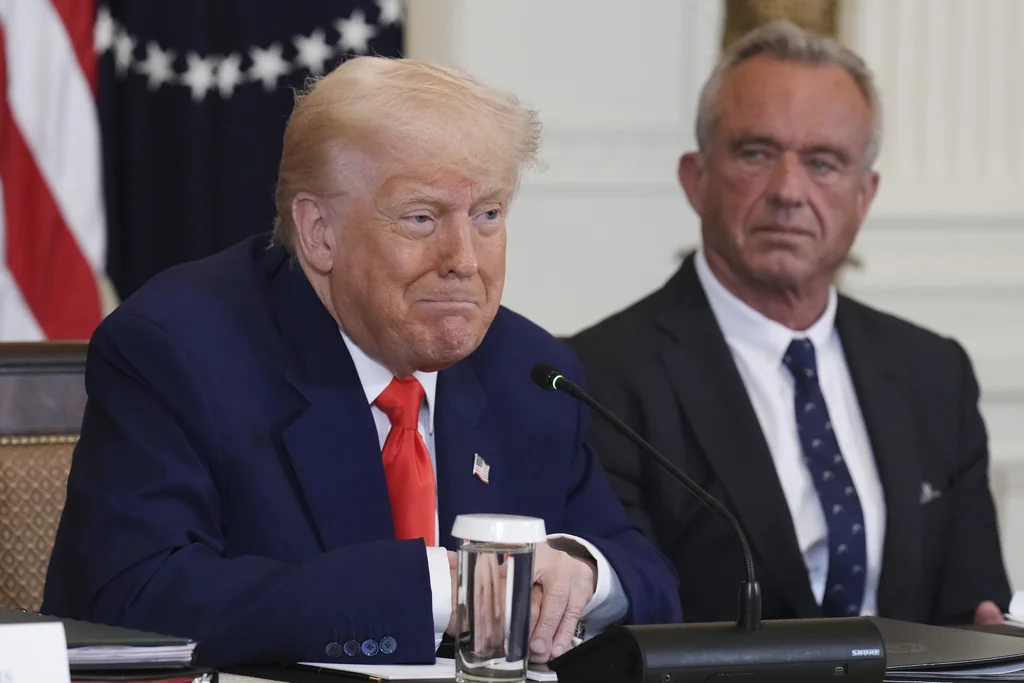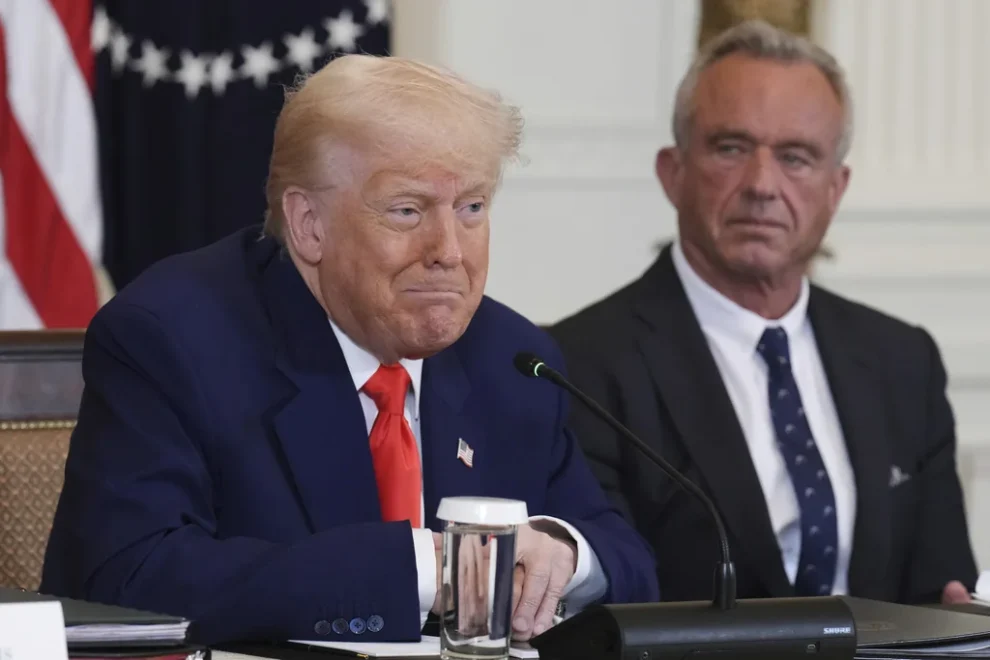President Donald Trump is on a mission to make America healthy again.
Trump’s MAHA agenda, formally adopted by the president after earning the endorsement of now-Health and Human Services Secretary Robert F. Kennedy Jr. last year, has exploded in popularity. A survey published last month by the Center for Excellence in Polling found sweeping support for the movement’s core principles, including 95% agreement that children’s diets should feature more food and vegetables, 96% support for putting warning labels on foods with high chemical levels, and 93% requiring bureaucrats and politicians disclose ties to pharmaceutical companies or food manufacturers.
However, the Trump administration’s publication of an error-riddled MAHA Commission report last month now has healthcare academics and professionals, from inside the “traditional” Western medical sphere and beyond it, raising concerns about the possible downstream negative effects of the president’s MAHA agenda.
WHITE HOUSE SAYS MAHA REPORT WILL BE REVISED FOLLOWING REVELATIONS OF CITATION ERRORS
Both New York-based nurse practitioner and functional medicine provider Jordan Crofton and Dr. Dua Hassan, a pediatrician and clinical instructor at Stanford University’s School of Medicine, criticized the report for failing to outline a coherent strategy to address the systemic problems outlined within its pages, even though both providers said they largely agreed with the report’s actual findings.
Crofton, who previously spent time working for a pharmaceutical company before studying under longtime Kennedy collaborator Dr. Mark Hyman and eventually co-founding Collective Medicine in 2023, told the Washington Examiner that she was actively displeased with the current level of politicization of health policy but has “cautious optimism” that Trump’s MAHA push will help to address the “root causes” of “escalating chronic disease in the country.”
“I do think the big picture here is accurate,” she said in an interview. “I also think there were some important points overlooked in that big picture, especially around systemic issues like maternal health inequities in under-resourced communities. These are pretty big ones, and I think if we want to reverse this chronic disease epidemic and really improve public health in a meaningful way, we have to consider all these upstream drivers. My concern is that while we’re finally naming these problems, we’re just not yet seeing signs of true structural change in policy or in practice.”
COULD SKEPTICS ON RFK JR. VACCINE PANEL BOOST CONFIDENCE?
“Banning Red Dye [No.] 40 and other food dyes, it’s certainly a step in the right direction,” Crofton continued. “Don’t get me wrong. Seeing what I see and the work that I do, it’s a long overdue acknowledgement of the harm that our food can cause, but it is such a drop in the bucket in the context of these massive, systemic issues at hand. I just have real concerns over what the actual action plan is. It’s great to, again, start calling out some of these issues, but I just have really quickly lost faith on what’s actually the plan here.”
Hassan similarly said she was surprised to find that the MAHA report reads “as if it were ghostwritten by a liberal think tank” but that she had problems with the administration’s apparent inability to embrace its conclusions.
“The MAHA Commission has accidentally written a landmark conservative admission that the free market doesn’t work in health care—that allowing corporations to operate without regulation corrupts institutions and undermines children’s well-being,” Hassan suggested in an op-ed published by Slate. “Stunningly, rather than embrace the obvious solution its data demand, the report pivots to blaming ‘the overmedicalization of our kids.’ That is, it claims that doctors like me and our health care system at large are too focused on treating illness and not on preventing it in the first place.”
“This is where the commission’s logic completely breaks down,” she continued. “It has spent dozens of pages documenting how corporate greed harms children, from selling them ultra-processed foods to exposing them to chemical toxins, creating an environment that leads to obesity, asthma, and other chronic illnesses.
“Then the group proposes solving this issue by giving those same interests more power while scapegoating the doctors trying to treat the resulting diseases of a system that prioritizes profit over well-being.”

Multiple veteran medical professors, all granted anonymity to openly discuss the matter without risking retaliation against their respective universities from the Trump administration, gave a much more sobering assessment of the movement: MAHA is going to kill people.
“Let’s call this what it is. A megalomaniac adopting the crackpot platform of a nepo-baby, heroin-addicted conspiracy theorist just because it looked good on a bumper sticker,” one professor assessed. “And because half of this country loves that megalomaniac, they’re already buying into this crap. Yes, there are problems with the healthcare system in this country, but you don’t solve it by pushing people toward skipping seeking out trusted, science-backed medical care.”
A second professor agreed that MAHA will “lead to a loosening of medical regulations and distrust of medical professionals,” both of which will “naturally” result in an increase in preventable deaths. That person additionally claimed that the Trump administration’s targeted deregulation of environmental protections “shows that these aren’t serious proposals.”
‘ONE BIG BEAUTIFUL BREAKUP’: WHAT’S NEXT FOR TRUMP AND MUSK?
“If you really cared about improving the health of children across the country, why is this administration making it easier to pollute our air or our waters?” that person asked.
“What we’re seeing is politics driving policy,” a third professor assessed. “There’s been a gradually growing distrust of science in this country, and the coronavirus pandemic supercharged that. I believe that, generally, we do have a choice problem in American healthcare. There are too few treatment options for patients to pursue, and they’re all too expensive. But pretending that this is a zero-sum game, accusing the entire medical field of corruption or questioning methods and technologies backed by decades and decades of proven research and real-world application, is just as deadly as keeping the system exactly as it stands, if not more.”
It’s nearly impossible to separate MAHA and its prominence in the second Trump term from Kennedy himself. The former Democratic-turned-independent candidate for president cut his chops as an environmental lawyer, but his steady transformation over the past two-plus decades into one of the nation’s most prominent anti-vaccine activists, known for backing his claims with falsified or misinterpreted medical research, obviously gives academics pause.
Hassan told the Washington Examiner that, while she does think MAHA has accurately identified that “in many corners of medicine we have become too dogmatic,” Kennedy’s overall approach to medicine is strictly anti-science.
“The issue is RFK Jr. does not approach medicine in a scientific manner,” Hassan said. “His approach is that of a lawyer — his actual professional background. He has a specific conclusion in mind, for example, that ‘vaccines are unsafe’ or ‘doctors overmedicalize.’ He then reasons backwards from this conclusion to find supporting evidence. So, RFK would say, ‘I already know vaccines are unsafe. What studies exist to support this conclusion?’”
“This was the major issue with the MAHA report,” she added. “They used the scientific literature to argue for their ideological conclusions. From an epistemological standpoint, it is why the document is inherently illogical, as I pointed out in the Slate piece. This is why ‘traditional’ medicine and the MAHA movement are at odds: The MAHA movement is inherently anti-science.”
Still, Hassan said she can understand how the COVID-19 response supercharged support for Kennedy’s movement, even with his sordid past.
“As physicians and scientists, we should always be questioning our assumptions,” she said. “Skepticism, heterodox thinking, and thinking outside of the box are requirements for scientific discovery. Once we stop questioning, medicine stops being a science and becomes a religion. Personally, I think this was a major shortcoming of the medical community’s COVID response. Instead of silencing dissenting voices, especially when they came from credible sources like practicing physicians, the medical establishment should have encouraged open discourse.”
Both White House and HHS officials declined to comment for this story.
Further complicating the MAHA debate is all of the money wrapped up in the brand.
Kennedy registered a trademark for “Make America Healthy Again” in December 2024, and his government financial disclosure forms showed Kennedy earning $100,000 in licensing fees for the use of “MAHA brand marks” on unspecified merchandise. And now, more than five months into the president’s term, both Trump and Kennedy’s political outfits continue to hawk MAHA-branded merchandise. Smaller, independent retailers and right-leaning political groups are also jumping on the merch train, selling shirts, mugs, and more, all adorned with “MAHA.”
Crofton told the Washington Examiner that MAHA’s rise has not necessarily resulted in an upswing in business for her practice and that she is concerned about any companies or individuals looking to drive sales by slapping MAHA on a variety of junk products.
“I have friends and colleagues, whose work I really respect, that have been on the front lines of MAHA,” she said. “I think that the monetization of it, outside of that, it’s just an unfortunate result of any time there’s any movement, there’s a trickle-down effect. I definitely do not support using that as a way to take advantage of people in any way, and I think, too, that we definitely can’t overlook the fact that there is some privilege to this movement as a whole.”
“The monetization in general that’s really a slippery slope and a dangerous slope, and that does concern me,” Crofton said. “That absolutely does concern me. At the end of the day, some of these fancy tools and longevity hacks that are maybe now being combined with this larger movement of MAHA, it’s kind of losing sight of the bigger picture of what I think we’re trying to accomplish here. A company trying to brand a red light under MAHA, that is absolutely just crazy.”
Hassan additionally raised cautions about how MAHA “wellness brand influencers” are incentivized to push products on social media, but she did suggest that there is a positive role they can play in community health.
TRUMP PRESSURES IRAN TO MAKE DEAL WITH US AFTER ISRAELI STRIKES
“The more social media engagement, books, and products they can sell, the more money they make,” Hassan said. “I have never been paid for recommending a specific vaccine or medication to a patient — neither has any pediatrician I know. However, Casey Means, Trump’s surgeon general nominee, is directly funded by the number of books she sells. Many of these wellness gurus are also paid by specific products for endorsements, which are often not made public.”
“However, I also think ‘wellness brand medicine’ has an important element to it in that it serves the role of a witch doctor — I mean that in a complimentary manner,” Hassan said. “They can be a resource for community knowledge and unconventional practices, giving individuals hope beyond evidence-based medicine. It becomes an issue when they aim to undermine known treatment practices that work. If health gurus were willing to put their suggestions through the rigor of the scientific method, I’d certainly be willing to partner with one of them on a study.”
























